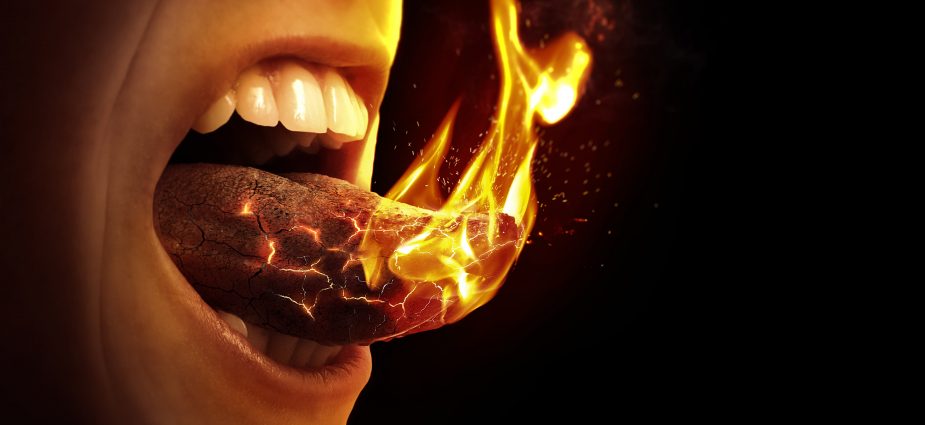Burning Mouth Syndrome: Symptoms, Causes and Treatment

Burning mouth syndrome is a chronic, painful condition characterized by burning sensations in the tongue, lips, palate (roof of the mouth), gums, inside of the cheeks and the back of the mouth or throat. The discomfort cannot be easily attributed to any physical abnormalities in the mouth or any underlying medical disorders.
A complicated and poorly understood condition, it appears to affect women seven times more often than men. Most sufferers are middle aged, but younger individuals also have been affected by the condition.
Burning mouth syndrome may also be called burning tongue syndrome, burning lips syndrome, glossodynia, stomatodynia and scalded mouth syndrome.
Symptoms
There are a number of symptoms associated with burning mouth syndrome, most notably the sensation of pain or burning. This sensation is typically mild in the mornings, becoming progressively more intense throughout the day, peaking in the evening and subsiding at night. Some sufferers feel continuous pain while others experience intermittent burning sensations. The pain can last for several months or years.
Other symptoms include dry lips, a sore or dry mouth, tingling or numbness on the tip of the tongue or in the mouth and bitter or metallic changes in taste.
Causes
The exact cause of the condition is still not clearly understood. A burning sensation or symptom in the mouth can result from, or be a symptom of, a number of oral and systemic conditions. These problems must be ruled out before a diagnosis can be made.
Some of the factors contributing to the condition include:
Nutritional deficiencies: Deficiencies of iron, folate and vitamin B complex have been associated with a burning sensation in the mouth. As a result, some treatment approaches have included supplements of B vitamins and minerals like zinc and iron.
Dry Mouth (xerostomia): Medications, Sjogren’s syndrome and any number of other causes can lead to dry mouth and its related burning sensation. Sipping liquids throughout the day, using artificial saliva and/or eliminating the cause of the dry mouth may reduce or eliminate the uncomfortable sensation.
Oral Candidiasis (Oral Thrush): A symptom of this oral fungal infection is a burning sensation in the mouth, particularly when consuming acidic or spicy foods, or when the cottage-cheese like lesions are scraped from the inside of the mouth. The plan that your dentist recommends to treat oral thrush can help end the sensations.
Diabetes: Diabetics are more susceptible to oral infections (including oral thrush) that produce burning mouth sensations. Additionally, diabetics are prone to vascular changes that affect the small blood vessels in the mouth, creating a lower threshold for pain. A better control of blood sugar levels in diabetic patients may prevent onset or help improve symptoms.
Menopause: Hormonal changes have been associated with a burning sensation in the mouth in middle-aged women. Burning mouth is among the most common oral manifestations of menopause. However, hormone replacement therapy has only been effective in relieving symptoms in certain patients.
Anxiety/Depression: Psychological problems do not directly cause burning mouth but could aggravate these symptoms or even result from the frustration patients experience dealing with their chronic pain. Anxiety or depression may have a role in initiation of destructive oral habits such as tooth grinding (bruxism) or tongue thrusting which can further irritate the lips and mouth. Stress may also lead to alteration of the flow or composition of the saliva, exacerbating the oral burning.
Other: Additional causes could be physical irritation from dentures, contact allergy to denture components (contact stomatitis) or oral hygiene products (Sodium Lauryl sulfate in toothpastes), gastroesophageal reflux disease, low levels of thyroid hormones, certain antihypertensive medications, changes in salivary composition, tongue thrusting and cancer therapy.
If you are experiencing burning sensations in your mouth, it is important that you visit your dentist as soon as possible to discuss your symptoms and undergo an examination. Your dentist will likely review your complete medical history and perform a thorough oral examination in order to help identify the local cause of these sensations in your mouth. If oral thrush (oral fungal infection), dry mouth, oral sores or other oral/dental issues are ruled out as the cause, you may be referred to a physician or an oral medicine practitioner for further evaluation and treatment.
Blood work and other diagnostic tests may be necessary to look for infection, nutritional deficiencies, diabetes or thyroid problems, Sjogren’s syndrome and allergy. Once identified, treatment is directed against the cause of burning mouth symptoms.
In the absence of local or systemic causes for oral burning sensations, the condition is diagnosed as burning mouth syndrome thought to be caused by neuropathy or dysfunction of the nerves involved in the perception of pain and taste sensations from the oral cavity.
Treatments
Treatments include different medications traditionally used to relieve the underlying causes of other conditions, such as depression and chronic pain. Tricyclic antidepressants (amitriptyline/Elavil), antipsychotics (chlordiazepoxide/Librium), anticonvulsants (gabapentin/Neurontin), analgesics, benzodiazepines (clonazepam/Klonopin) and mucosal protectors have provided effective relief for some patients.
In addition, topical capsaicin (the natural chemical in cayenne pepper) has been used to desensitize patients suffering from burning mouth syndrome.
However, despite the success of these approaches in certain situations, there is no universal treatment that is effective in all cases. Treatment is planned to meet the specific needs of each patient. The cost of treatment varies depending upon the medications prescribed (if any), how long they will be needed and whether or not medical and/or dental insurance will cover all or some of the costs.
Additional relief may be achieved by making some simple changes:
- Stop using mouthwash that contains alcohol.
- Stop using toothpaste that contains sodium lauryl sulfate.
- Chew sugarless gum, preferably sweetened with xylitol.
- Avoid alcoholic beverages.
- Use baking soda and water when brushing your teeth.
- Refrain from drinking beverages with high acidity (fruit juices, coffee, soft drinks).
- Abstain from tobacco use.
- Sip water or suck on ice chips.



